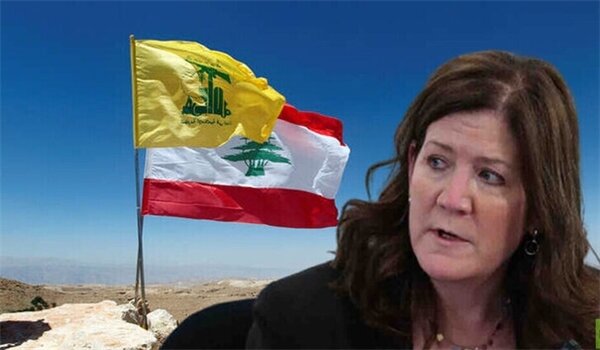American ambassador brings the political conflicts back to the surface in Lebanon

In recent days, Arab media outlets have been discussing the implications of a verdict issued by a Lebanese judge to ban media from talking to the U.S. ambassador to Beirut after she took direct aim at Hezbollah in a provocative move.
After the American ambassador's remarks, Judge Mohammed Mazeh, who is based in Tyre, passed an order on June 28 to stop media outlets from speaking to Ambassador Dorothy Shea or reporting her comments for a year or face a $200,000 fine. The verdict will become obligatory if approved by the country's Information Ministry.
However, Mohammad Mazeh was put under question by the Judicial Inspection Board for the ban before he submits his resignation on June 29, according to state media.
On June 29, Lebanese Foreign Minister Nassif Youssef Hitti had summoned the American ambassador over her remarks against Hezbollah.
"The Lebanese foreign minister summoned the American ambassador to protest against her meddling in Lebanese domestic affairs and to confirm that the Foreign Ministry rejects the statements of Ambassador Shea, about the Lebanese parties and groups which have wide Lebanese support in the government and the parliament," Lebanese National Media Agency said.
In an interview on Saudi-owned Al Hadath TV last week, Shea had said: "Hezbollah is destabilising the country and jeopardizing Lebanon's economic recovery."
In fact, the American ambassador's statements triggered widespread political reactions in Lebanon. In this regard, Lebanese parliamentarian Hassan Fadlallah strongly condemned the "insulting words" of the ambassador on June 28, describing it as a brazen affront to the country, and a challenge to international norms.
He stressed that "her statements are a blatant attack on Lebanon's sovereignty and its national dignity," calling on the authorities "to take immediate action to compel this ambassador to respect international law," Lebanese media reported.
It seems that the American ambassador tries to echo American supremacists' deceptions, which may be part of a strategy to exploit internal conflicts in Lebanon.
She deals with the Lebanese nation and its government as if the country is under colonial rule.
In this regard, Lebanese journalist Abir Bassam told Tehran Times that the United States is openly meddling in Lebanese internal affairs.
"It is not the ambassadors' job in general to discuss the country's' internal affairs," she added.
Shea's superior manner in accusing a Lebanese political party of neglecting its social base is considered insulting and obvious interference in the domestic affairs by most Lebanese people as well as provocative to those who always aligned with the Resistance.
In this regard, Haitham Abu Said, West Asia commissioner for human rights, pointed out to certain regulations and standards prohibiting ambassadors from interference in domestic affairs of the host country.
“Any kind of interference in the host country's internal affairs, inciting any group against another group, calling for participation in demonstrations, gatherings, and meetings for a coup against the host authority or creating any riot is unacceptable, according to the Vienna Convention on Diplomatic Relations 1961," Abu Said told Tehran Times.
Lebanon is witnessing the worst economic crisis in its modern history, as national currency lira has lost 80 percent of its value since October when nationwide anti-corruption protests began to shake the country.
Corruption is one of the most important factors in this crisis and it cannot pay its debts. To make matters worse, the U.S. has imposed sanctions targeting Hezbollah to infect the entire Lebanese banking sector, all of which will inevitably have a devastating impact on the Lebanese political scene.
However, the Lebanese government tries to manage and contain the economic crisis; still, some political leaders in Lebanon are sabotaging efforts to reform the economy by supporting American policies in the region.
Leave a Comment